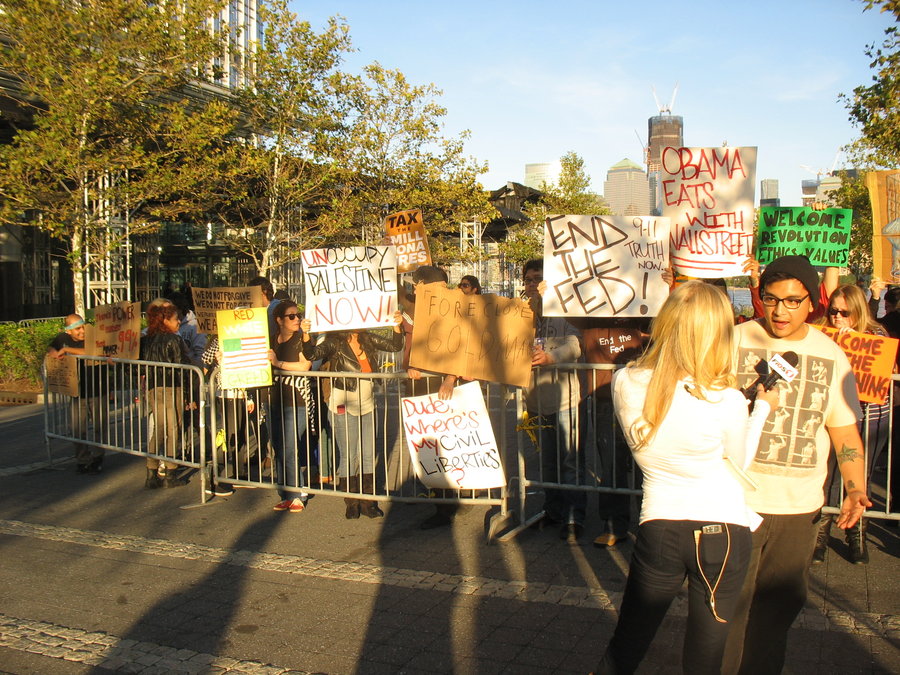Thursday night, after the Occupy Wall Street demonstrators brought their protest to the Goldman Sachs Tower in Jersey City’s Exchange Place, Hudson County residents weighed the pros and cons of the protest, and whether it will have any impact on the political and banking systems in the country.
The growing protest began about four weeks ago in New York City’s Zuccotti Park in lower Manhattan. At that time the demonstrators said they were protesting so-called “corporate greed” and banking laws that allegedly reward such greed.
Since then, the protesters have developed a list of demands that seek to restructure corporate taxation policies and put an end to corporate influence in politics.
Detractors have called the protesters’ demands “unfocused.”
But in recent weeks, the ongoing, 24-hour protests in New York have only grown and spawned satellite demonstrations in Washington, D.C., Boston, Los Angeles, Chicago, Philadelphia – and right here in Jersey City. The demonstrations have now gained the support of several unions and celebrities.
About 50 to 100 protesters showed up Thursday night at the Jersey City protest. No arrests were made.
The growth of the protests, some have argued, is an indication that the demonstrators’ demands – however “unfocused” they may be – have tapped into an underlying anger many Americans feel.
“I haven’t really paid a lot of attention to these protests they’ve been doing in New York, and I’m not really sure I understand what they’re really protesting,” said Jersey City resident Ellen Sneider, a pharmaceutical marketing executive in New York. “But, economically, everyone I know feels like they’re drowning, just barely able to pay their bills and have some quality of life. There does seem to be this inequity. People work so hard and aren’t getting ahead, but we’re supposed to be one of the richest countries in the world. Doesn’t make sense.”
She said she assumes the protesters chose Wall Street as the site of their demonstrations “for symbolic purposes.”
Dave Burke, a bank teller who lives in Hoboken, but who works at a bank branch near Wall Street, said he sees the protesters everyday and has talked to a few of the demonstrators.
“Some of them are a lot more knowledgeable about banking policy than I thought they’d be,” said Burke. “They’re trying to change banking policy, tax policy. I don’t know how you build a movement around that. I’m not sure these protests will accomplish that long-term.”
Still, working as a teller, Burke sees how stretched people are financially.
“I see people with full-time jobs, they’re professional, and all they have is $75, $80, 100 bucks in the bank.”
Like Sneider, he said he understands why the protesters are angry.
Not everyone was sympathetic to the demonstration, however.
Mani Hope, a Jersey City resident who works for the New York Stock Exchange, said she resents being labeled “a zombie,” the protesters’ name for corporate employees. Hope offered a lengthy defense of the U.S. banking system and argued that federal regulations on banks and corporation are as much to blame for the current economic state of the country as so-called “corporate greed.” She also said that capitalist principles are what the U.S. was founded upon – and she pointed to recently deceased tech genius and Apple, Inc. CEO Steve Jobs as an example of what can happen when capitalism is allowed to thrive.
Ironically, when asked whether she believed her children would have a better life than she has, she said, “I don’t know. I hope so. But I do worry. I make more money than my parents did. But I have huge school debts that I’m still paying off…My husband and I work a lot harder than both our parents. I’m not sure our quality of life is better than theirs. I admit, the trend doesn’t bode well for my sons.”
The Occupy Wall Street protest outside Goldman Sachs was, according to Jersey City police, a low-key affair, unlike the Zuccotti Park demos.
E-mail E. Assata Wright at awright@hudsonreporter.com.
Our Digital Archive from 2000 – 2016
